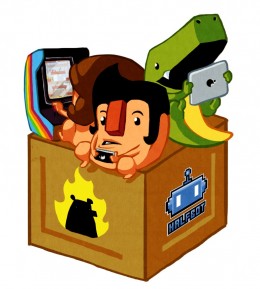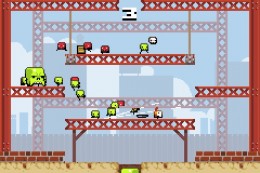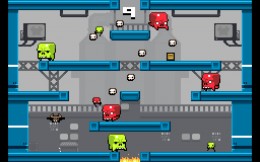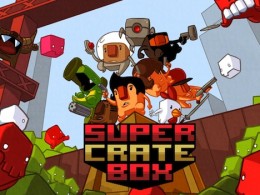 You see a form of this question in almost every high profile game’s review: why doesn’t this have iCloud support? Apple’s remote storage service is a tremendous offering that lets us resume any supported game from any connected Apple device. During our commutes, we can bang out a couple of minutes in Infinity Blade 2 on our iPhones. Later, at home, we can finish the section we were exploring on our iPads. When the service works, it’s awesome, but we don’t see a lot of games using it. It’s a surprise when one does.
You see a form of this question in almost every high profile game’s review: why doesn’t this have iCloud support? Apple’s remote storage service is a tremendous offering that lets us resume any supported game from any connected Apple device. During our commutes, we can bang out a couple of minutes in Infinity Blade 2 on our iPhones. Later, at home, we can finish the section we were exploring on our iPads. When the service works, it’s awesome, but we don’t see a lot of games using it. It’s a surprise when one does.
We spent a few days asking a small pool of independent game developers why they aren’t incorporating iCloud in their latest games. What we discovered isn’t surprising: iCloud is always on a good studio’s radar, but the pitfalls of indie development keep it there. It’s too alien, and maybe even a little too wonky, for cash-strapped and low-bandwidth studios to take a chance on.
I’d Buy That For A Dollar
 Time, cash, and bandwidth are the three most important resources to the production of any good game. If there’s not enough of one or the other, something goes bad. In the age of $.99 download these resources are even more precious. Their effects on the creation of games are exaggerated to the point where even experimentation on things like iCloud, no matter how easy it might be to implement, becomes a liability. Vlambeer says it couldn’t commit time and resources to iCloud with Super Crate Box because it didn’t have the time or cash to spare.
Time, cash, and bandwidth are the three most important resources to the production of any good game. If there’s not enough of one or the other, something goes bad. In the age of $.99 download these resources are even more precious. Their effects on the creation of games are exaggerated to the point where even experimentation on things like iCloud, no matter how easy it might be to implement, becomes a liability. Vlambeer says it couldn’t commit time and resources to iCloud with Super Crate Box because it didn’t have the time or cash to spare.
“We think iCloud is a great technology and we can totally see why Apple is pushing it," Vlambeer’s Rami Ismail tells TouchArcade via e-mail. “The thing is that while from the user side it’s an easy thing to set up, as developers it’s a new thing that we have to consider, learn to use, and then apply."
Super Crate Box is the first game Vlambeer has made for iPhone and iPad, so that put an unusual strain on the studio. By the time iCloud support could become an actual bit of functionality as opposed to just a desire, Vlambeer had decided its time would be better spent on tweaking the game’s controls.
Ismail tells us about another wrinkle: now that Super Crate Box is out in the wild and its users have multiple saves across devices, there’s a worry that throwing in iCloud at this point could cause something horrible to happen, like loss of progress or even high scores. It’s happened before with other games.
Zombieville 2, for example, launched and included the service when it was new. Creator Mika Mobile learned something in the process: iCloud has a hard time when both local data and cloud data are in the picture. If it pulls the wrong set, it could potentially corrupt a save.
 This sort of problem has branching consequences. If Vlambeer has to fix a broken Super Crate Box, that’s a month spent on a finished game when it could be working on something else, draining resources that it just doesn’t have. Ismail breaks down how close to the edge Vlambeer was when it started on Super Crate Box and explains why this informed its decision to not include iCloud.
This sort of problem has branching consequences. If Vlambeer has to fix a broken Super Crate Box, that’s a month spent on a finished game when it could be working on something else, draining resources that it just doesn’t have. Ismail breaks down how close to the edge Vlambeer was when it started on Super Crate Box and explains why this informed its decision to not include iCloud.
“Like with basically everything in life, money is a consideration when making games," Ismail said. “Consider the following: Super Crate Box had five people working on it — the two at us at Vlambeer and two guys at Halfbot. Since we felt the people that made the original art and music deserved a bonus for their work on the original, we decided to pay them out a little holiday money as well."
“We pay ourselves far below minimum wages because we hardly have any real-life costs at this point. However, the Halfbot guys both have families to support. Multiply the costs of two families and two students by the amount of months it took us to make the game. Then add a few thousand dollars for art and music — AND then add the Apple developer license, iPads, iCades and all other stuff we used to test the game on… the costs simply start adding up and up." Ismail estimates that Super Crate Box on iOS cost his studio around $15,000.
 “The shorter a project is and the fewer people work on it, the lower your costs are and the easier it is to create risky projects. This is essentially why a lot of indie studios remain small — we want to make games we love to make and honestly, if we could avoid all business and just do that without any worries, we’d be doing that. However, there’s always the economic realities, so we have to consider all that as well. In the end, we love making games, but we want to be able to keep making games."
“The shorter a project is and the fewer people work on it, the lower your costs are and the easier it is to create risky projects. This is essentially why a lot of indie studios remain small — we want to make games we love to make and honestly, if we could avoid all business and just do that without any worries, we’d be doing that. However, there’s always the economic realities, so we have to consider all that as well. In the end, we love making games, but we want to be able to keep making games."
“During development, at some point, you run out of time or money — whatever you want to call it. If things went well, that’s a point at which most improvements you could make to the core game make barely have any noticeable effect. With Super Crate Box, we chose to spend a lot of time on such tiny improvements, especially to the controls. Burning through spare money from our release of Serious Sam: The Random Encounter, we just kept going until the gameplay in Super Crate Box iOS was the best we could make it."
“That turned out to be six months later. Basically we found ourselves running out of everything. At that point, we considered adding iCloud, but obviously that was too late to do that. If we wanted to do that, we’d end up figuring out how to add it, where to add it to the code, how to make sure we don’t damage player save games or even delete some save games — basically, it’d add an additional month to development."
Ismael said at this point Vlambeer had two options: it could either gamble by adding content and support that might or might not work or require additional resources, or it could release a good game. “When we have to choose, we always go with releasing a fun and solid game. We’ll usually pick a few technologies that we feel would benefit the game most, so in Super Crate Box‘s case that was Game Center, OpenFeint and iCade support." Vlambeer says it’ll always pick the latter when it comes down to quality versus any form of external support.
End Of The Day
 Other studios that we talked to for this story, including Simogo and Uppercut games, told us that their latest projects didn’t launch with iCloud support because of similar reasons. Vlambeer isn’t the only studio on the App Store deciding to hold out on iCloud support in an effort to stay nimble and put out the best game that it possibly can within a sustainable timeframe.
Other studios that we talked to for this story, including Simogo and Uppercut games, told us that their latest projects didn’t launch with iCloud support because of similar reasons. Vlambeer isn’t the only studio on the App Store deciding to hold out on iCloud support in an effort to stay nimble and put out the best game that it possibly can within a sustainable timeframe.
It’s also obvious to us that iCloud and the implementation of it needs to be easier, and the service itself needs to be more reliable. Almost every studio we talked to had some trepidations or a horror story to share. Browse our message board, and you’ll find even more from users receiving the bad end of an iCloud problem.
That’s not to say iCloud isn’t awesome. It is. Games that use it, like Infinity Blade 2, are better for the implementation. iCloud could also be used for stuff beyond saves, so there’s promise of what’s to come. We simply want to see more of it.
Studios like Vlambeer and most others know that you take gaming as seriously as they do, so iCloud support isn’t ever going to just get thrown into the mix. Solid implementation takes time and money to pull off, though, and these are finite resources. Studios may want to roll in the support, but until they can afford to do it, iCloud will continue to be a staple of the cutting room floor.